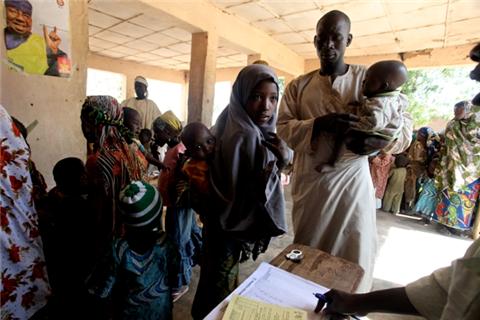
KANO, NIGERIA, December 2011 – It is 10.00 a.m. at the health facility of Dawakin Tofa, one of the villages in Kano State with several polio cases this year. Outside of the health facility, a group of women – health educators, community mobilisers and vaccinators – are preparing to start a house-to-house polio immunization “mop-up” activity to reach every last child. Among this group, Ms. Hafsat, vaccinator, and her team were assigned to cover a remote village of Yansalmo, where block resistance to polio immunization by the community is still persisting.
“Why is the polio vaccine given round after round when there is no health care nor clean water in our village? There are so many other diseases like malaria, cholera and meningitis that kill our children; drugs are either unavailable and we cannot afford to buy them,” a representative of the village asked when the team arrived.
In Kano State, continued community resistance to the polio eradication programme is profoundly impacting progress. Caregiver refusals, or non-compliance, to immunize their children still make up a significant proportion of the total number of children missed during campaigns, and refusals are on the rise in some high-risk areas. According to the latest data analysis, non-compliance accounts for more than four (4) out of ten (10) of missed children in Kano State and in ten (10) Local Government Areas (LGAs), non-compliance accounts for fifty percent (50%) of missed children.
“It is difficult to convince families under these circumstances, especially when they are facing multiple deprivations. But, through compound meetings and community dialogues, we were finally able to convince villagers to accept the oral polio vaccine. We have been successful in turning around their resistance by increasing their threat perception of polio,” Ms. Hafsat said.
To address the issue of resistance to polio immunization, local government and polio eradication partners organize regular community dialogues with the support of traditional leaders. In fact, according to the latest data analysis, almost eight out of ten of resolved non-compliance cases were due to traditional leaders’ interventions.



